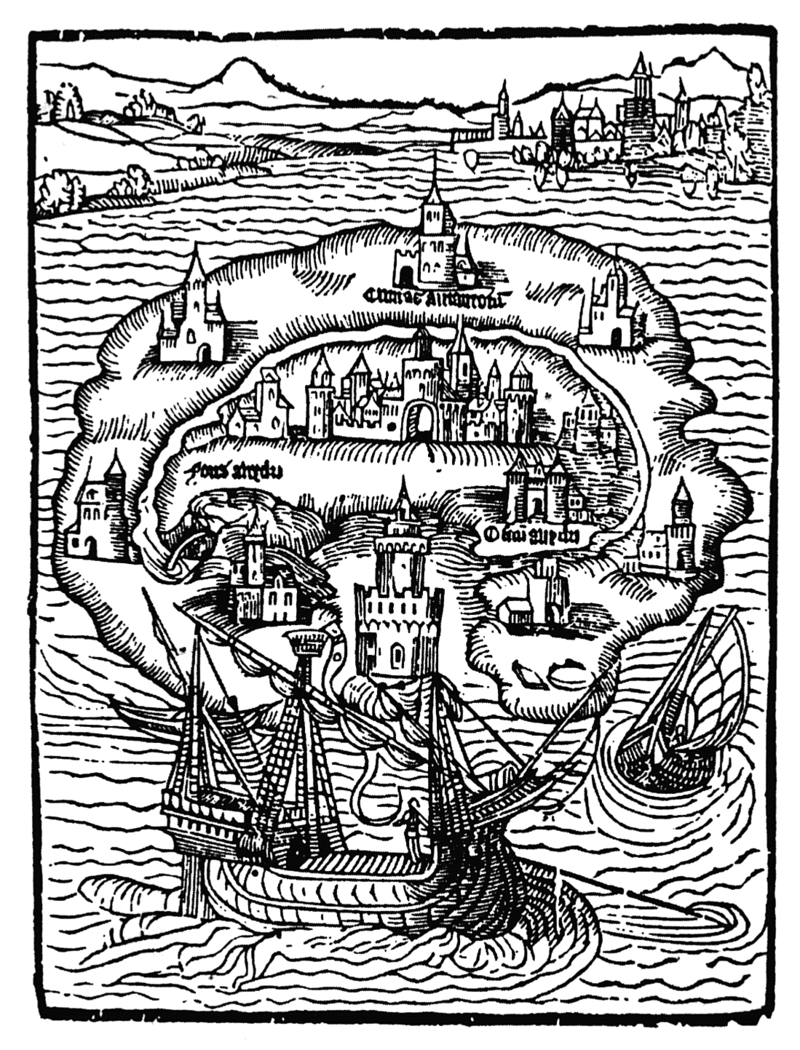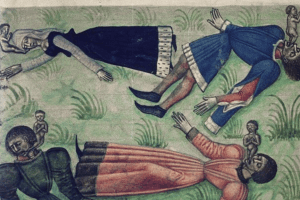It was exactly 500 years ago that the first edition of Thomas More’s On the Best State of a Republic and on the New Island of Utopia appeared. Utopia, as it is commonly known, turned out to be a signifier that has managed to adhere—without it being its original aim— plenty of human projects of the most diverse causes, yet the same in nature. Countless applications and references, as well as banners, have been waved in the course of 500 years on behalf of the great—not the small?—Utopias of man. One could affirm that they all agree on procuring a state of ideal world whose conditions are inscribed in the realm of certain impossibility. A Utopia is such as all difference, all discontent, is eradicated on behalf of the well-being and happiness of all mankind. Its status of Utopia—liberated long ago from the text which brought the term to life—survives ages due to its undisputed nature of dream, unrealizable ever still.
We know, courtesy of Zygmunt Bauman, that Utopia is a neologism of More that condenses the Greek words eutopia, regarding the expression «good place», and outopia, which regards to «no place» [1]. Consequently, Utopia is the good place that is nowhere. This might seem like an oxymoron of the highest poetic craft, that finds its natural habitat in the political sphere—curiously, the very instance in which men insist on bringing about communion from the inexorable condition dictated by difference. Politics is not the field of happiness and that is known from its birth. On the contrary, impasse is at its core and reason; politics pre-exists because we are different. What can Utopia as a response to the political fact suggest, then?
Jean Servier, a meticulous reader of More’s work, talks about the context in which it was born. «(…) abuses were [ever] more outrageous and clearer the gap between the mighty and the miserable (…) Violence, disturbances, and uprisings break out, the promises of the gospel were taking too long already (…) The people no longer awaited the arrival of The Savior»[2]. It is a difficult scenery for England’s Henry VIII’s political establishment. More himself—a jurist, magistrate, treasurer of the Crown, and member of the King’s private council—would renounce his office in 1532 by declaring to be at variance with his King’s projects for marriage and religion—intentions that would result and lead to the separation from the Roman Catholic Church and the creation of the Anglican Church, among other things. In fact, More would be beheaded two years later because of his choice.
As you see, More’s Utopia appears as a dreamy response in a society in which no Utopia was to be seen coming on the horizon. Servier addresses it «as the representation of the dream in which the bourgeois concerned about order and average happiness took pleasure.»[3] He himself warns that More didn’t hesitate to classify his own work as «a literary bagatelle that, almost without noticing, slipped from my quill.»[4] We could argue that, for More, the dream came to take the place of his political reality—or at least that is what his writing manifested—, chasing the realization of an unrealizable desire. More knew that in real life something was simply not working.
Of course, what for him didn’t measure up as a literary, but as a political work, went by inconsequential in the convulsed England of Henry VIII. Nonetheless, Utopia would ever since become a reference whose essence we might condense as follows: To bring about harmony, order, and happiness where the political doesn’t work.
More’s references to Plato’s Republic are not scarce. An ouevre—who could doubt it—of the same lineage as Utopia, perhaps its oldest and most primal referent. Of course, one couldn’t say that the Republic of Socrates’ disciple was utopian; the coincidence is not as much in the signifier as in the causes resembled. Manuel Fernández Galiano, a great Hellenist and commentator on ancient thought, offers a rich reading on the nature of Plato’s proposal and on the emergency in which its discourse is inscribed. He states: «(…) it is not foremost the ideal built of a perfect society of perfect men, but, precisely as said, a remedial thing, a treatise on political medicine applied to the existing regimes of his time.»[5]
It is known that Plato starts from a diagnostic on the state of the social bonds and the administration of power and political discourses in the city-states of his time. Let’s remember the four forms he recognizes as the prevailing political regimes: Timocracy, Oligarchy, Democracy, and Tyranny. We shall not pause on any of them except to point out the absolutely conflicted position Plato assumed towards any of the four regimes, including democracy, the political system of his native Athens—by then, far from the splendors of the Pericles administration. Athenian democracy in the days of Plato was marked, in the philosopher’s opinion, by the same «ills» as the rest of the cities.
The power of the demos—the people—had done terrible things. Perhaps the most sinister and incomprehensible of which, for Plato, had been the slaying of his master Socrates, who was charged with accusations that could only be reckoned as profound ignorance about the matters of thought and the lives of men. In a passage from the text, Plato addresses one of his main interlocutors: « (…) there is no rest from ills for the cities, my dear Glaucon, nor I think for human kind.»[6] Plato condemned what, for him, democracy had become: a «capricious» system that encouraged «audacity» and «improvisation.»[7] A well contended criticism is deployed from section 557 a onwards, about whom Plato called the «egalitarian man.»
This is why Plato insists on placing upon the shoulders of the philosopher king (which Fernández Galiano translates as related to a specialized body of citizens [8]) the matters of the State. Just like More, Plato responds by designing a closed society (it’s not by chance that Utopia was an island and that the Republic could only be comprised of certain chosen individuals, while others were expelled). In both cases, the model aimed at an order that left no room for any possible manifestation of social distortion. Needless to say, Plato’s Republic—in the way he envisioned it—didn’t quite transcend as an effective political system either; just like Utopia, it remains in the dreamy chambers of the men of letters and philosophy.
Such arguments also echo in the history of the birth of sociology at the hands of August Comte and, later on, Emile Durkheim, by the end of the 19th century. The former, also called ‘father of positivism’, established as the slogan of his philosophical doctrine: Altruism, order, and progress. Comte’s project was the restoration of the social order that had been broken by the French Revolution and the libertarian ideas that emanated from it—embodied in men such as Voltaire and Rousseau. For him, Science (a pyramid atop which was the Science of Society) was responsible for giving answers to the problems of the societal man. We must not forget that the 19th century was the century of revolutions in Europe, a climate that, faced with chaos, marked the restorative nature of Comte’s thought.
Influenced by the rise of Biology, both Comte and Durkheim conceived the society of their time as an affected and ill body, whose stability required the intervention of State institutions. Let us recall that Durkheim spoke of injecting «solidarity» into the fractured social bonds in order to make them stronger and better—that is, in order to respond to the differences that the social division of labor had accentuated in favor of the industrial splendor of mature modernity. We shall go no further in this direction, given it is clear that we may as well include positivist sociology in our collection of reveries. Even if it does not correspond with a sociopolitical model, nor rest in an iconic oeuvre either (as is the case with Utopia and the Republic), this epistemological current holds close coincidence with the nature of utopias. To put it bluntly, never before had Utopia been taken so seriously as in modernity.
Bauman points out that our contemporary notion of Utopia was born with the ideas of progress and well-being of modernity, and it could only breathe within that atmosphere [9]. The modern dream of an aseptically organized society (let us read Foucault), free from social disturbances—or that which modernity had labeled as illnesses—, was the substance of that daydream. In fact, that is how psychoanalysis was born, with the listening of a scientist gentleman that was Freud on the narration of a hysterical woman pre-diagnosed with the symptom of the time: modern nervousness. It is no coincidence that the founding work of the analytical discourse was titled by Freud The Interpretation of Dreams. Something in the realm of what was repressed by the discourse of this dreamy society came up poignant and without barriers in the fabric of dreams. This is the epoch (at the close of the 19th century) in which the promise of happiness that mobilized the modern project began to show its cracks.
Sigmund Freud’s Civilization and Its Discontents [10] questions precisely that: the failure of idealized happiness. Such a zenith of happiness is an unattainable endeavor, for the very cultural impositions that force the subject to relinquish his most primeval impulses, confine him by means of prohibition. The discontents of civilization in the age of Freud were proof of the cracking of the epochal discourse in which Utopia as a place pursued closely by human reason, suddenly vanished far down the running lane. However, Freud was able to deliver something to this disheartened world: clinical assertion, along with a prolific theoretical development, that subjects are neither simply good nor bad—they are in the extent of their pulsions, that is, of the management and care (halfway between the conscious and the unconscious) of their partial relinquishing of happiness.
If the three aforementioned projects—Thomas More’s Utopia, Plato’s Republic, and the positivist Sociology of Comte and Durkheim—coincide as an answer to the human chaos in which treatment requires achieving the taming of pulsions, Freud’s Die Traumdeutung (original title of The Interpretation of Dreams), on the contrary, proposes granting them a place. This is very important because, not only does it mark a new dimension of the function of dreaming as a realization of a repressed desire—namely, as an unbridled response to the impositions of the time—, but it also gives Utopia a new bias. Ever since Freud, one cannot talk about dreams and utopias in the same way as before; that is because pulsions are simply unrelinquishable. A project cannot be forged in the name of Utopia without difference popping up to point out what Lacan, a few years after Freud’s death, condensed as: «There is no sexual relation.»
«There is no sexual relation,»[11] a statement that shocks the vendors of full happiness, means nothing more than to say: There is no relationship among sexed beings; that is, that there is no one destined for me, there is no genetic code dictating how to relate to other human beings, beings of language. There is no law—no matter how deeply rooted it might be within the systems of culture—that determines what it is to be a man or a woman, what it is to be a child, how to respond to the demands of culture, of others, how to respond to our own desires, being marked as we are from the beginning by the incompleteness of the absence of oneness—except for a complex imaginary construct mediated by the void between body and language.
The pulsation of the void, of occupying this void, is what gives meaning to the lives of men. But therein too lies their deep discontent, for this void will never be filled and, on the contrary, will make the subject that what (rationally, yes, but also contingently—i.e. with the precariousness that follows the encounter with a void, with a hole, something that was perhaps full in the motherly lap but was sacrificed in the interest of cultural birth. Contingency does not undergo control of reason) the subject makes out of his/her own lack. We are doomed to misunderstanding and yet this is how we understand each other. The language of communication is radically mediated by desire and the inexistence of sexual relation. Let’s think now: Is it possible to build Utopia—a world of equals, devoid of tensions—without having the desire of its members to attend their lack constantly springing?
When we say with Bauman that Utopia could only exist in the climate of modernity, it’s because only during that time was a discourse—the hegemonic discourse of the so-called “Name-of-the-Father”, of rigid morals and punishment for the inattention of good manners—able to keep pulsions (the desire to attend the lack) repressed. Up until the beginning of the 20th century—world wars marked the consummation of the aggressiveness contained in the modern dream; after that, nothing can be taken quite as before—, European societies (Latin America deserves an aside to account for its specificities) were organized around the phallic signifier, that is, the incorruptible saying of the father, his ethical and moral imperative. But, fast-forwarding to what the reader eagerly implores, how do we transfer this discussion to our time? Namely: Is it possible to build a Utopia just as the potency of its concept promotes? Can we speak of Utopia today?
Science and the market have already dealt with this question. Ours is definitely a different epoch than that of Freud’s. Modernity gave way to globalization and this, in turn, to global capitalism (this is a convention). The truth is that this displacement in the order of discourse is not exactly one of repressed individuals. Quite the opposite, the hypermodern discourse (as it is also called) commands: “you can do it all,” “the sky is the limit,” “chase your dreams,” “do what you want,” “you can have it all,” “everything you want you can buy”—science and the market are ready to take on the order of the day. The idea of happiness has undoubtedly shifted to the place of merchandise or gadget, as Lacan called it. Consume as much as you can, that will make you happy; science and technology will take care of your desire. Are you male wanting to be female? Do you want your children to have the traits you’ve always dreamed of? Do you want to get the most fabulous orgasms without needing to address the other? If you can buy it, go ahead, full happiness has arrived at your door.
It’s not a matter of criticizing scientific advance for the sake of humanity, let alone the small pleasures the market gives us; it’s a matter of not turning science and the market into Utopia. We must not forget: pulsions cannot be tamed. They need to be given a place, but not under the umbrella of science, nor in the halls of a shopping mall. Much less is it a matter of politically embodying a project that swipes away market dynamics in the name of Utopia: behind this insistence hides the face of power wanting to bring about the derangement of some men raising the flat flag of happiness.
Shall we renounce Utopias, then? Let the reader rehearse an answer. As for me, I propose to change their names, to call them something else, whatever you like. I don’t mean to talk about individual Utopias either, for it is not without the other that we are in this world. There is no quixotic adventure without its Sancho, and vice versa. My invitation in no way resembles what Francis Fukuyama promoted in the 90s as “the end of history and ideologies,” giving way to postmodern thought—less committed to the subject’s political reason. My invitation does not mark a beginning nor an end, my invitation is to sustain the singularity that allows each one to bond with the others. Not to renounce the antagonism of the political fact, that is, the single human condition that soils us as much as it embellishes us: difference as a distinctive trait among speaking beings. The best political project is one sustained by difference.
Lastly, in the face of contemporary crisis—not only in Venezuela but in the entire world—evidenced by the return of a reposed fascism, proliferation of brutal fundamentalisms, exhaustion from the overexposed discourse of freedoms which has produced nothing but a larger feeling of individual fragility; to sum it up, in the face of contemporary difficulties, Utopia cannot be the outlet (as happened in the three aforementioned examples), pretending to ignore all that symptom made history. Perhaps, we will have to think of small possibilities for building bonds with the others, in small communities or nuclei of desire whose mainstay does not imply unification of the mass jouissance nor the extermination of difference.
All that swimming to wind up ashore. By now you are probably thinking that my proposal is still utopian, that power will never succumb to difference. That’s possible, but a huge shift requires detaching the modern hoax of Utopia from the cause of the subject in his/her world. To give Utopia a new name is to single out and enable encounter with the others without having the failure and violence of the One lurking around like a deadly bird above any project of human grouping.
Up to here are my thoughts on Utopia and our time. You may as well take it, if you wish, as a literary bagatelle.

References
[1] Bauman, Zygmunt (2007) Tiempos líquidos. Vivir en una época de incertidumbre. Tusquets Editores. México D.F. p.135.
[2] Sevier, Jean (1995) La utopía. Fondo de Cultura Económica. México D.F. p.39. See also: Servier, Jean (1969) La historia de la Utopía. Monte Ávila Editores. Caracas [Translator’s free translation].
[3] Ibid p.40 [Translator’s free translation].
[4] Idem [Translator’s free translation].
[5] Platón (1988) La República. Introducción y traducción de Manuel Fernández Galiano. Alianza Editorial. Madrid. [Translator’s free translation]. For this text, we used the following digital version:
http://www.edu.mec.gub.uy/biblioteca_digital/libros/P/Platon%20-%20La%20Republica.pdf p. 2.
[6] Plato (1968) The Republic of Plato. Translated with Notes and an Interpretative Essay by Allan Bloom. Basic Books. The United States of America. For this translation, we used the following digital version: http://www.inp.uw.edu.pl/mdsie/Political_Thought/Plato-Republic.pdf p.153 (473 d).
[7] Platón. Op. Cit. p.5.
[8] Ibid. p.6.
[9] Bauman. Op. Cit. p.138.
[10] Freud, Sigmund (2010) El malestar en la cultura. Alianza Editorial. Madrid.
[11] See: Lacan, Jacques (1995) Seminario 20. Aún. Paidós. Buenos Aires.
About the author:
Jordi Santiago Flores (Caracas, Venezuela) is a researcher at the Center for Critical and Sociocultural Research of the Universidad Simón Bolívar (CICSC-USB). He is a professor at the School of Arts of the Universidad Central de Venezuela (UCV). He is currently writing his doctoral thesis in the line of Psychoanalysis and Social Sciences of the UCV’s Social Sciences Ph.D. program. His fields of interest orbit psychoanalysis, art, and politics. He is an Associate of the New Lacanian School at Caracas.

















